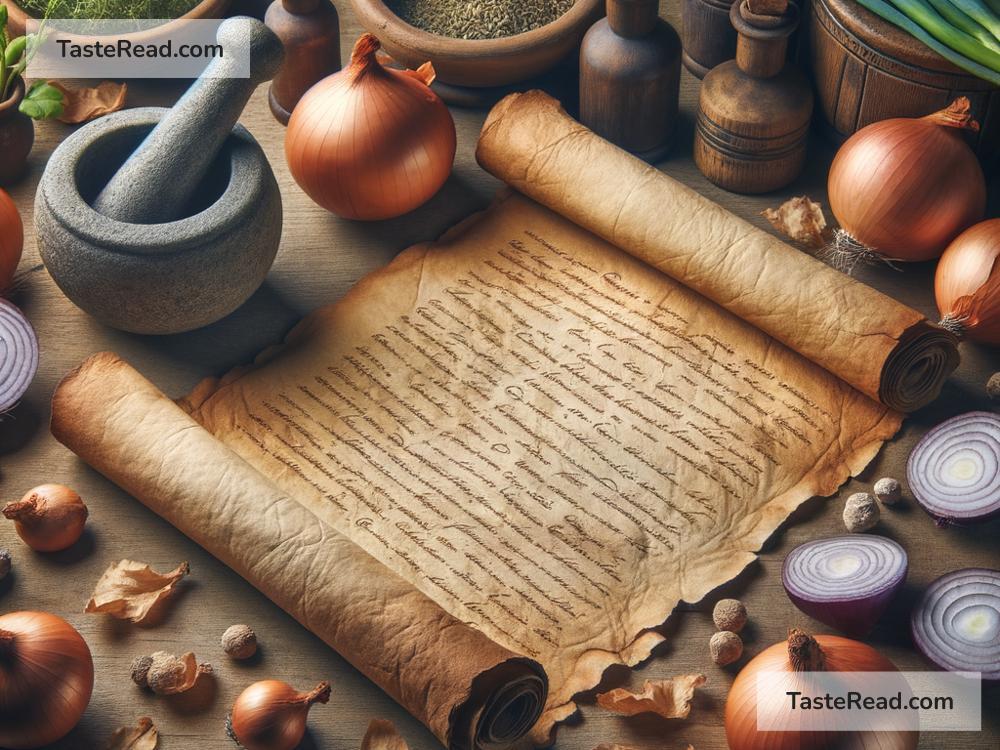The Fascinating History of Onions in Ancient Medicine
Onions might seem like an ordinary kitchen ingredient to us today, but throughout history, they have played a much bigger role than just adding flavor to food. These layered bulbs were once considered a powerful medicine that could heal illnesses, drive away evil, and even give strength to warriors. Across ancient cultures, onions held a special place not only in cooking but also in healing. Let’s dive into the fascinating story of how onions were used in ancient medicine and why they were so highly valued.
Onion Origins and Early Discoveries
The onion has been cultivated for thousands of years, likely originating in central Asia. Archaeologists believe that onions were among the first cultivated plants, with evidence suggesting their use as far back as 5,000 years ago. Easy to grow and store, onions quickly became important to ancient societies.
But onions weren’t only popular because they were a reliable food crop—they were also admired for their health benefits. Ancient civilizations noticed that onions could help keep people healthy, particularly during harsh winters when fresh fruits and vegetables were scarce. They were also known for being durable and easy to transport, making them accessible to various cultures.
Ancient Egypt: Onions for the Soul and Body
In ancient Egypt, onions held a special place in both medicine and religion. The Egyptians believed onions symbolized eternity because of their concentric rings. They were often used in burial rituals, and onions have even been found in the tombs of Pharaohs, including King Tutankhamun. It was thought that onions protected the soul and provided strength to the dead as they journeyed into the afterlife.
As for medicine, priests and healers used onions to treat illnesses and improve overall health. They believed onions could purify the body: consuming them was thought to remove harmful substances and strengthen the immune system. Onions were also used externally for wound care and skin irritations.
Ancient Greece: The Warrior’s Vegetable
The Greeks had great respect for onions, especially when it came to preparing their athletes and soldiers for battle. Before competitions or wars, Greek athletes and warriors ate large amounts of onions, believing they gave strength and improved stamina. Some even rubbed onion juice onto their muscles, thinking it would enhance their physical abilities.
Greek doctors, including the famous Hippocrates, used onions in their treatments for ailments ranging from digestive problems to respiratory issues. Onions were thought to possess antiseptic properties, meaning they could kill harmful bacteria. They were also used in poultices to reduce inflammation and treat wounds—similar to how a modern bandage might be used.
Ancient Rome: Healing and Flavor
In ancient Rome, onions were a staple food that also doubled as a popular medicine. Roman soldiers carried onions with them not just for nourishment but also for their healing properties. Onions were thought to help prevent infections in wounds and even improve circulation when eaten regularly.
Roman physicians prescribed onions to treat colds, sore throats, and other respiratory conditions. They believed the strong smell and taste of onions could clear blocked airways. Additionally, onions were used to promote digestion, and some believed they could cure hangovers. Their sharp flavor made them a comforting companion to wine-drinking Romans.
India and China: Onions in Holistic Medicine
In ancient India, onions were widely used in Ayurvedic medicine, where natural remedies are used to promote balance in the body. Onions were considered “warming” foods, meaning they could help stimulate energy and circulation. Ayurvedic practitioners prescribed onions for treating nausea, enhancing digestion, and purifying the blood. People also used onion juice to soothe insect bites and wounds.
In China, onions became part of traditional medicine as early as 2000 BCE. Chinese healers recommended onions for everything from coughs and colds to heart health. They believed that onions could increase qi, or life energy. Onion tea was often used to relieve fever, while onion poultices were applied to boils and swelling.
The Medieval Period: The Power of Onion Cures
During the Middle Ages in Europe, onions continued to serve as both food and medicine. They were widely used to treat the common cold, headaches, and even more serious illnesses such as the plague. Europeans would boil onions into soups and teas that were thought to help recover from sickness. Onions were also believed to keep bad spirits and illnesses away; some households even hung onions above doorways for protection.
Modern Science Explains Why Onions Were Valued
Although many ancient beliefs about onions might sound superstitious today, modern research has shown that onions are, in fact, packed with nutrients and health benefits. They contain compounds like antioxidants, which fight harmful molecules in the body, and sulfur, which may help prevent infections and reduce inflammation. Onions are also rich in vitamins and minerals, such as vitamin C, potassium, and fiber, which support a healthy immune system and digestion.
Conclusion: The Humble Onion’s Legacy
From Egyptian tombs to Roman battlefields, onions have carried a legacy that spans thousands of years. Across ancient cultures, this humble vegetable was a respected medicine and a symbol of health and protection. Today, while onions are most often appreciated for their role in cooking, their medicinal history remains a fascinating reminder of how humans have relied on nature’s gifts to heal and thrive.
Next time you slice an onion, think about the thousands of years of history behind it. You’re holding a vegetable that helped ancient warriors, healed sick children, and was even considered sacred by some of the world’s greatest civilizations. Truly, the onion is much more than just a vegetable—it’s a symbol of humanity’s timeless quest for health and wisdom.


